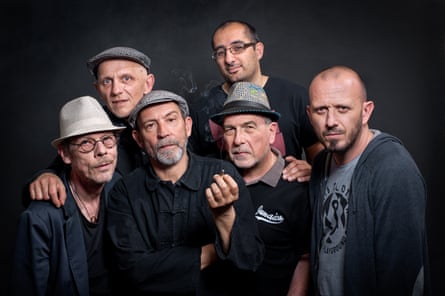It’s May Day in Marseille, and beyond the celebrations – and the ongoing protests against President Macron raising the retirement age – another smaller but just as potent group are taking a stand on behalf of marginalised voices. It’s the 30th edition of the annual street party la Sardinade des Feignants (translated as the Lazy Man’s Sardinade), organised by the 40-year-old Massilia Sound System, a raggamuffin reggae and dub collective. In the blazing sun, the band toast the exuberant crowd as cooks grill sardines, the regional staple that give the celebration its name, off to the side.
Massilia also sing in Occitan, AKA langue d’Oc, and promote the conservation and vibrancy of this language and its dialects. The romance language sounds like a mixture of Catalan and Italian with barely a hint of a French accent, and its speakers sweep across the Pays d’Oc of southern France and into the Pyrenees and northern Italy. But today, says Massilia’s Tatou, AKA Moussu T (Mr T in Occitan), “the government still sees regional cultures that are not the language of the court of Versailles as exotic, folkloric, bizarre – cute but unimportant.”
As the French revolution of 1789 brought about the first French republic, the government imposed a clear interpretation of French identity that did not include regional languages and cultures. The revolutionaries commissioned Catholic priest Henri Grégoire to study regional languages: his 1794 report on how to “annihilate the patois and to universalise the use of the French language” became a cornerstone of policies outlawing any languages other than French being used in public life, taught or even spoken in schools. As Parisian French became the symbol of liberation, unity and progress, regional languages such as Occitan were considered anti-progress by the middle and ruling classes.
These languages continued to be spoken in working class neighbourhoods, factories, on the docks and in the countryside beyond Paris, and the 1960s, “when the US and Britain were rediscovering their traditional musics such as blues and folk, French artists, musicians and writers did the same,” says Benjamin Minimum, a songwriter and former music editor of global music magazine Mondomix.
Jan dau Melhau in Limousin or Claude Marti in Carcassonne were among those releasing records in Occitan through the 70s, along with Mont-Jòia, a Provence quartet playing lute, mandolin and dulcimer along with regional instruments like the galoubet recorder, tambourin drum and zither string tambourine.
In the early 80s a second wave branched out from the folk revival including the Fabulous Trobadors from Toulouse, who sang in Occitan to Brazilian and hip-hop rhythms, and Massilia Sound System, who named themselves after the original Occitan word for Marseille. For them, the inspiration to sing in langue d’Oc came from further afield: hearing “the Jamaicans singing in their patois and owning their heritage,” says Tatou. “We decided we could sing in our own French-Occitan patois.” Massilia’s mission statement couldn’t be clearer from the title track of their 1992 debut album Parla Patois, sung in Occitan with the chorus: “He speaks a language that Babylon won’t understand / Speak patois, start and don’t stop.”
A young urban following started to take hold in parallel to the reaction against anti-immigrant party Front National; Parla Patois’ message of unity-through-toasting resonated with those who saw a connection between the marginalisation of minorities and regional cultures the same way British punks in the 70s felt connected to reggae. “In the 70s and 80s Marseille had graffiti saying, ‘les arabes à la mer’ – send Arabs to the sea,” remembers Occitan language singer Manu Théron, whose group Lo Còr de la Plana has toured Europe and America since the 90s. “This led to ratonnades – racist attacks like the American tradition of lynching, all over the city, where Arabs would be attacked. It was very violent.”
This sparked the March for Equality and Against Racism that started in Marseille in 1983 and evolved into two months of marches throughout France. “The fight against centralism has always gone hand in hand with the fight against racism,” says Tatou who performed with Massilia Sound System at many anti-fascist protests. A posse of their fans, the Massilia Chorma, also organised protests in areas where the Front National was gaining momentum and adopted the same phrase of the Occitan thinker Felix Castan that inspired Massilia Sound System: “We are not the product of a soil but the product of the action we take on it.”
Théron’s then group Gacha Empega performed at several anti-fascist protests including Front National’s Bruno Mégret 1995 mayoral campaign for Vitrolles just outside of Marseille and protests against rapper Ibrahim Ali’s 1995 murder by fascist militants.
Théron was another performing at anti-fascist protests. He had previously travelled through Europe and Algeria playing piano and singing Delta blues and classic Neapolitan and French songs. When he was teaching French in Bulgaria he studied ancient texts and started writing Occitan poetry, frustrated by his country’s attitude to its regional cultures. “You have a German cultural identity in the northeast, Flemish culture in the north, Celtic culture in Brittany and Occitan in the south, Basque culture in the south west and Italian culture on Corsica,” he says. “The government tried to cancel” these cultures, he says, because they were “not part of the so-called ‘French identity’.”
We meet after he teaches a polyphonic singing class at the local Occitan cultural centre, Ostau dau País Marselhés. Occitan music was monophonic – one voice singing – or purely instrumental until Théron founded the polyphonic singing trio Gacha Empega on his return to Marseille in the mid-90s: “I wanted to highlight the language itself and the words, which the first generation had forgotten to do.”

Today music in langue d’Oc is experiencing a similar revival to the likes of Portuguese fado and Spanish flamenco as young people reclaim their cultural heritage. Limoges psychedelic rock trio Brama formed in 2019 and sing in Occitan to drums, guitar and electric hurdy gurdy; in 2020, the Toulouse polyphonic singing duo Cocanha made waves when when Barcelona musician (and Rosalía and Lee Ranaldo collaborator) Raül Refree produced their album Puput.
The duo Butor Stellaris formed in Arles, Provence, in 2019 and combine traditional Occitan instruments such as hand drums and guitarróns with old digital technology such as Gameboys and touch-tone telephones. Henri Maquet is an ethnomusicologist who has been involved in the indigenous music movement for more than a decade, and formed the band with his partner, Emmanuelle Aymés.
“The famous Occitan language poet Frédéric Mistral said: ‘Cotin, la lengo, tin, la clos’ – the one who holds the tongue holds the key’,” he says. “Language opens a door on to popular knowledge that is hidden in the songs, in the texts, in the way of expressing oneself. It opens up a whole thought process about the country and the culture. You can express things that you just can’t express in French.”
Today, the stigma surrounding France’s regional languages has lessened. Regional languages entered the school system in the late 70s; there are university courses in Occitan. This April, the state-owned national public television broadcaster France Télévisions released the first Occitan-language TV series, La Seria, a meta comedy drama about one man’s attempt to get an Occitan series off the ground. Yet France still refuses to ratify the 1992 European Charter for Regional or Minority Languages, the convention for the protection and promotion of languages used by traditional minorities, and unlike much classical French culture, government grants for projects in langue d’Oc are hard-won, meaning that most of them are self-funded. “We are funnelled to a marginal department with a much smaller budget,” says Maquet. “So we are completely fai lou tièu – DIY. We have to fight all the time and defend the value of this.”
Back at la Sardinade des Feignants, Massilia Sound System close out the street party by sharing the microphones with a rotating cast of friends. Flares are lit as people sing along and cheer, while the cooks begin cleaning the grills. The festive atmosphere brings to mind a comment Tatou made earlier. “I don’t like to say we defend Occitan culture as it implies closing of ranks and exclusion of other cultures,” he says. “Our mission is to promote it and make it for everyone.”

